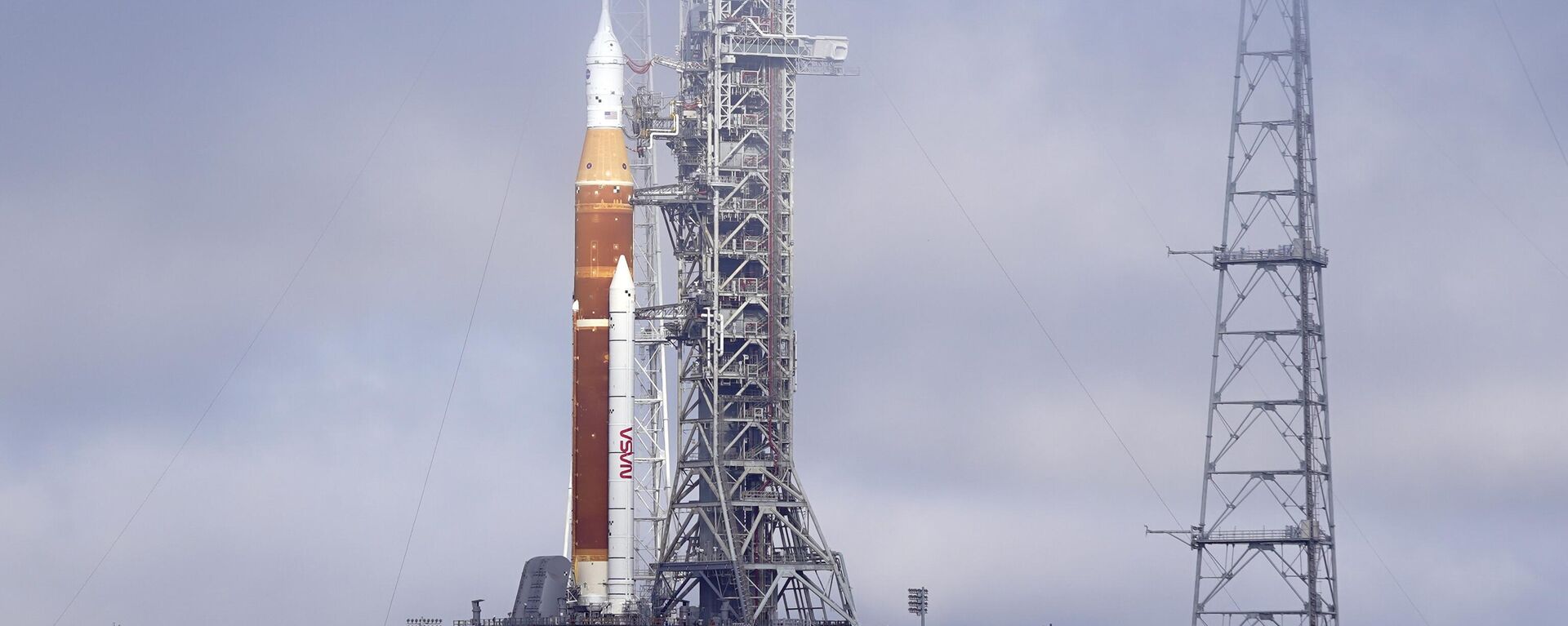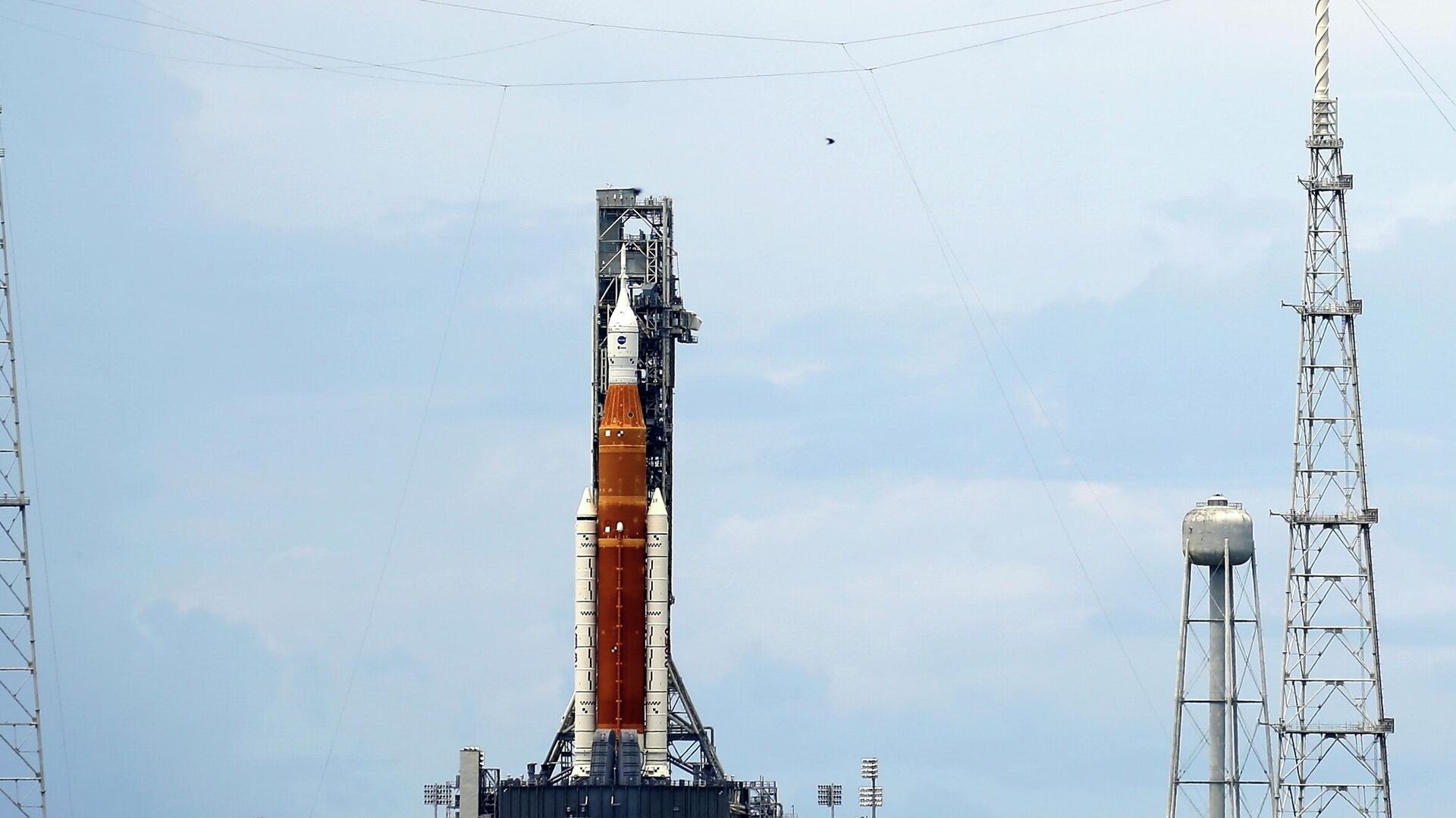https://sputnikglobe.com/20220829/nasa-set-to-launch-its-first-unmanned-artemis-mission-on-monday-ahead-of-mars-exploration-plans-1100097886.html
NASA Set to Launch Its First Unmanned Artemis Mission on Monday Ahead of Mars Exploration Plans
NASA Set to Launch Its First Unmanned Artemis Mission on Monday Ahead of Mars Exploration Plans
Sputnik International
One of the objectives of the Artemis program is to land the first woman and person of color on the lunar surface. Twelve men walked on the moon between 1969... 29.08.2022, Sputnik International
2022-08-29T03:31+0000
2022-08-29T03:31+0000
2023-04-12T17:03+0000
science & tech
nasa
artemis
moon landing
moon
space
https://cdn1.img.sputnikglobe.com/img/07e6/08/1d/1100098266_0:0:2361:1328_1920x0_80_0_0_f9658aa69d7578b833753d74cdde4cec.jpg
The Artemis program of NASA's strategy to send people back to the moon as a first step toward a future trip to Mars is expected to conduct its first unmanned test flight on Monday. The Orion crew capsule and the 322-foot (98-meter) Space Launch System rocket are being tested during Artemis 1. The rocket will launch from Florida's Kennedy Space Center on Monday at 8:33 a.m. local time (12:33 GMT).On the flight, sensors-equipped mannequins will replace the crew members and measure the degrees of vibration, acceleration and radiation. Before landing in the Pacific Ocean, Orion will orbit the moon.As for the next step, the crewed Artemis 2 mission, scheduled for 2024, will orbit the moon without making a surface landing, just like Apollo 8 did. Before this year is over, the names of the crew's four members will reportedly be announced, and one of them is likely to be a Canadian, per the AFP. Since Apollo 17 in December 1972, the third Artemis mission will be the first to send astronauts to the moon. NASA reportedly chose the southern pole of the moon, where water in the form of ice has been discovered, as the site of NASA's first crewed spaceship landing. The previous landings on the moon have taken place near its equator.A program audit conducted by a third party reportedly revealed that although Artemis 3 is supposed to happen in 2025, it might not happen until 2026 at the earliest. NASA intends to launch crewed flights around once a year beginning with Artemis 3.Moreover, Elon Musk's SpaceX has been chosen by NASA to construct the moon lander for Artemis 3. The still-in-development SpaceX Starship will act as a shuttle from the Orion crew capsule to the lunar surface and back. A space station dubbed Gateway is anticipated to be built as part of the Artemis program and will orbit the moon. The living quarters module and power and propulsion system are scheduled to launch by a SpaceX Falcon Heavy rocket at the earliest in late 2024. The Gateway would need to be put together by Orion personnel, according to the program's statement.A lander that would enable them to go to the moon and back would eventually be available to astronauts after they spend 30 to 60 days in Gateway. Additionally, Gateway would act as a pit station on any future trips to Mars, that are expected to be the ultimate goal for the mission.In order to get ready for a voyage to Mars, NASA will use the information gleaned from Artemis concerning the future spacesuits, vehicles, propulsion, resupply, and other areas. The objective is to discover how to sustain human presence in deep space for an extended period of time.While it just takes a few days to travel to the moon, it would take at least six months to travel to Mars.
https://sputnikglobe.com/20220827/worlds-biggest-auxiliary-rocket-boosters-to-propel-artemis-to-moon---northrop-grumman-1100048705.html
Sputnik International
feedback@sputniknews.com
+74956456601
MIA „Rossiya Segodnya“
2022
News
en_EN
Sputnik International
feedback@sputniknews.com
+74956456601
MIA „Rossiya Segodnya“
Sputnik International
feedback@sputniknews.com
+74956456601
MIA „Rossiya Segodnya“
science & tech, nasa, artemis, moon landing, moon, space
science & tech, nasa, artemis, moon landing, moon, space
NASA Set to Launch Its First Unmanned Artemis Mission on Monday Ahead of Mars Exploration Plans
03:31 GMT 29.08.2022 (Updated: 17:03 GMT 12.04.2023) Kirill Kurevlev
Managing Editor
One of the objectives of the Artemis program is to land the first woman and person of color on the lunar surface. Twelve men walked on the moon between 1969 and 1972. The Apollo program was referenced in the choice of the name Artemis; in Greek mythology, Artemis was Apollo's twin sister and a goddess connected to the Moon.
The Artemis program of NASA's strategy to send people back to the moon as a first step toward a future trip to Mars
is expected to conduct its first unmanned test flight on Monday.
The Orion crew capsule and the 322-foot (98-meter) Space Launch System rocket are being tested during Artemis 1. The rocket will launch from Florida's Kennedy Space Center on Monday at 8:33 a.m. local time (12:33 GMT).
On the flight, sensors-equipped mannequins will replace the crew members and measure the degrees of vibration, acceleration and radiation. Before landing in the Pacific Ocean, Orion will orbit the moon.
As for the next step, the crewed Artemis 2 mission, scheduled for 2024, will orbit the moon without making a surface landing, just like Apollo 8 did. Before this year is over, the names of the crew's four members will reportedly be announced, and one of them is likely to be a Canadian, per
the AFP. Since Apollo 17 in December 1972, the third Artemis mission will be the first to send astronauts to the moon. NASA reportedly chose the southern pole of the moon, where water in the form of ice has been discovered, as the site of NASA's first crewed spaceship landing. The previous landings on the moon have taken place near its equator.
A program audit conducted by a third party reportedly revealed that although Artemis 3 is supposed to happen in 2025, it might not happen until 2026 at the earliest. NASA intends to launch crewed flights around once a year beginning with Artemis 3.

27 August 2022, 01:19 GMT
Moreover, Elon Musk's SpaceX has been chosen by NASA to construct the moon lander for Artemis 3. The still-in-development SpaceX Starship will act as a shuttle from the Orion crew capsule to the lunar surface and back.
A space station dubbed Gateway is anticipated to be built as part of the Artemis program and will orbit the moon. The living quarters module and power and propulsion system are scheduled to launch by a SpaceX Falcon Heavy rocket at the earliest in late 2024. The Gateway would need to be put together by Orion personnel, according to the
program's statement.A lander that would enable them to go to the moon and back would eventually be available to astronauts after they spend 30 to 60 days in Gateway. Additionally, Gateway would act as a pit station on any future trips to Mars, that are expected to be the ultimate goal for the mission.
In order to get ready for a voyage to Mars, NASA will use the information gleaned from Artemis concerning the future spacesuits, vehicles, propulsion, resupply, and other areas. The objective is to discover how to sustain human presence in deep space for an extended period of time.
While it just takes a few days to travel to the moon, it would take
at least six months to travel to Mars.


